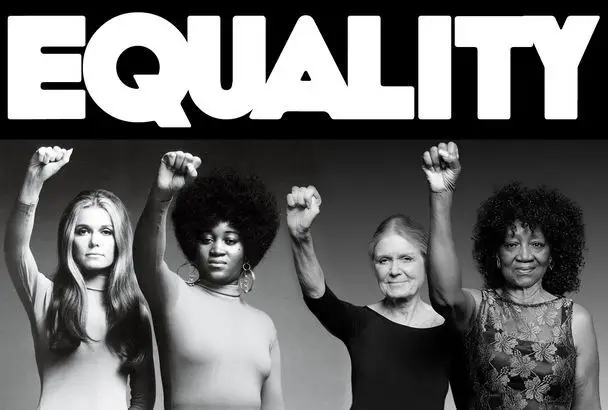Embracing Feminism
All too often, women are mistreated their entire lives but have no idea.
By Sophie Hurlock, Xavier University
For a good bit of my life, I thought feminism was a waste of time, sexism was dead and all the feminists out there were just sad women blowing things way out of proportion.
I saw myself as a strong woman, one that was too strong to need the crutch of feminism. Turns out though, I was dead wrong.
It took two years of college for me to see just how many sexist situations I had experienced throughout my life, and how, at the time, I had thought the situations were okay. It took me nineteen years to realize that, because so many women before me fought for the rights that I now take for granted, I have a better quality of life than any woman has ever had before. As a result, at the age of twenty, I now proudly proclaim myself to be a feminist.

What exactly does it mean to be a feminist? As a feminist, can you still have a boyfriend? Can you still rock a pink bathrobe as a feminist? Can you be a man and a feminist? The answer is yes, yes and yes.
Too often do I hear women when asked if they are a feminist, reply with, “Well, I don’t know, I’m all about equality, but I don’t know if I’d go as far as to call myself a feminist.” Too many people believe that the rights of women were won with the women’s liberation movements of the sixties and seventies. Unfortunately, though those crusaders certainly advanced the cause, the fight is far from over. In fact, being a feminist now may be more important than it ever was, specifically because women have come so close to reaching their goals.
One reason that the world still needs feminism is because the world still has sexism. It may not be as obvious as it was in the fifties, when ads showed men spanking their wives as if they were children, reminding patriarchs everywhere to “Show her it’s a man’s world.”
No, though sexism today is less overt, it is no less insidious. One of the main culprits is the media. If it’s not celebrity news programs dragging a woman through the mud because she put on weight, it’s socially backwards films and television series portraying tired, outdated stereotypes. From the bitchy boss, as portrayed in the “Devil Wears Prada,” to teenage girls constantly being at war with each other, as portrayed in literally every teen show ever, writers refuse to let the caricatures die.
Take, for example, the show “The Big Bang Theory,” a program that boasts the second-largest audience in the country with over 20 million viewers. While the show does have some strong female characters, such as Amy and Bernadette, both of whom are scientists, the two are portrayed as ugly, average, girls-next-door.
On the other hand, Penny, who is a waitress and failed actress, is portrayed as the slutty, community college drop-out, a characterization that abides by the ancient patriarchal dictum that attractive women must be stupid.
On top of her clichéd one-dimensionality, the writers go on to suggest that Penny’s life, which is always an unemployment- and ex-boyfriend-filled mess, is only better when she’s dating her knight in shining armor, the nerdy genius Leonard. Her utter helplessness, combined with her dependence on Leonard, is just a friendly reminder that if you’re female and your life is a mess, all you need is to get you a good man.
Sexism in the media may be crippling, but at least it only affects fictional characters; in the workplace, though, women get treated to the real thing. Women still only make seventy cents to a man’s dollar, a figure that only worsens for women of color. As much as you may hear these statements repeated again and again, it’s because they are still true.
A professor of mine who worked in the film industry recently told me a story about when she was younger and working on a film set. In addition to acting, she was also working a waitressing job at the time, and one day she told the director that she would be unable to make it to the shoot because she was scheduled to wait tables.
He responded, “That’s okay, I only hired you for your body.”
Although this was a while ago, incidents like this continue to happen. Although I am not a fan of Hillary Clinton, many of her struggles during the past election stemmed from public sexism. When a female is the most qualified candidate for a job, yet still loses to a man with no experience, it indicates that many Americans are still hesitant to believe that women can accomplish what men can.
So, what can college students do to help the feminist movement? The simplest, and often most effective form of action is simply speaking up when you witness an injustice. Whether the sexist action is intentional or unintentional, firmly acknowledge it and work to explain in an effort geared toward educating the offender.
In high school, I, like a lot of other girls, would laugh right along with the others when ridiculing the appearance or sexual exploits of another girl. I never realized until I came to college that my inaction was a part of the problem.
In addition to shutting down sexist remarks, you can also educate yourself. The professor I mentioned earlier, who had experienced blatant workplace misogyny, told me that once, when she was waitressing, a man asked her what she was doing to help the feminist movement. She replied, “I’m working two jobs to put myself through school so I can get a good job.”
Finally stand with your fellow women and men. Do not tear one another down, but bring each other up. Together, we are a lot stronger and can accomplish more than we can as individuals.


















[…] Read the full article from the Source… […]
[…] Read the full article from the Source… […]